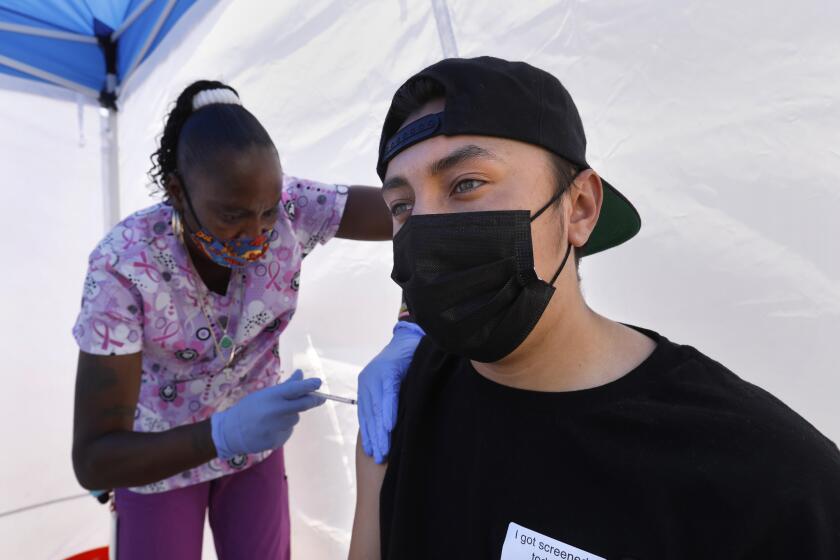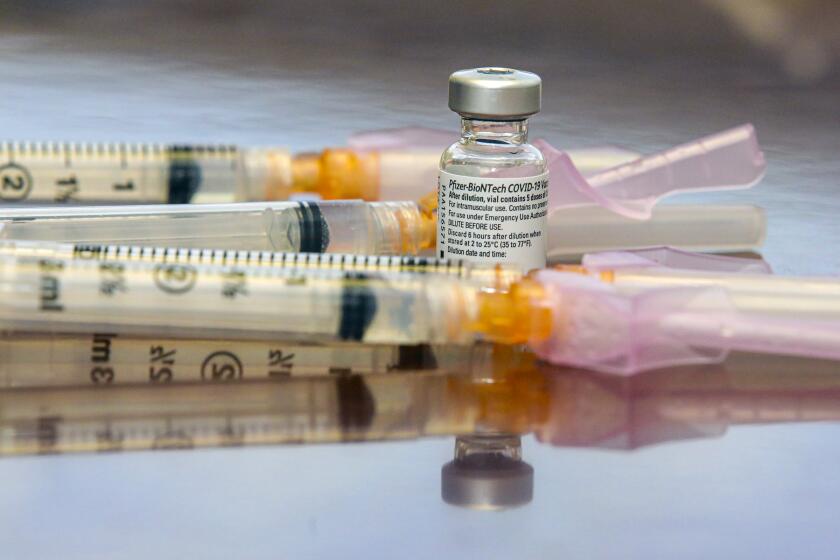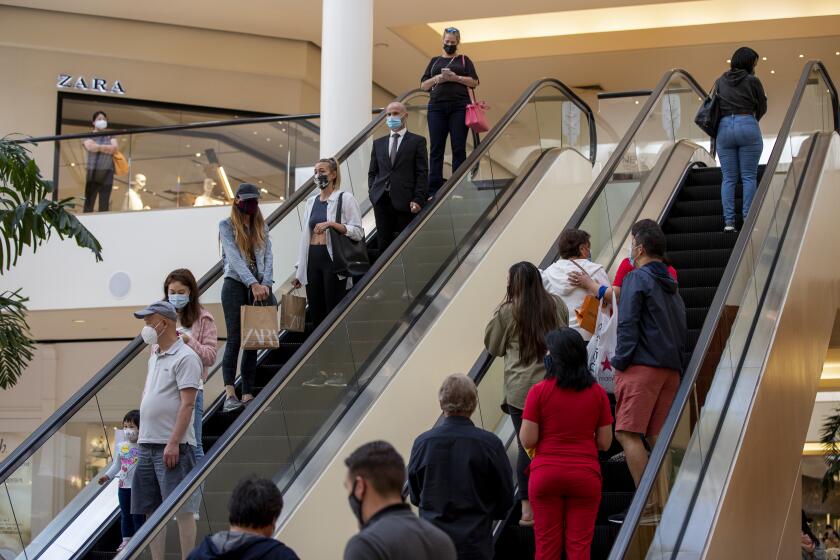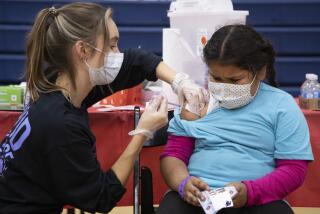For teenagers, vaccinations are a ticket to freedom. Some parents still not sure
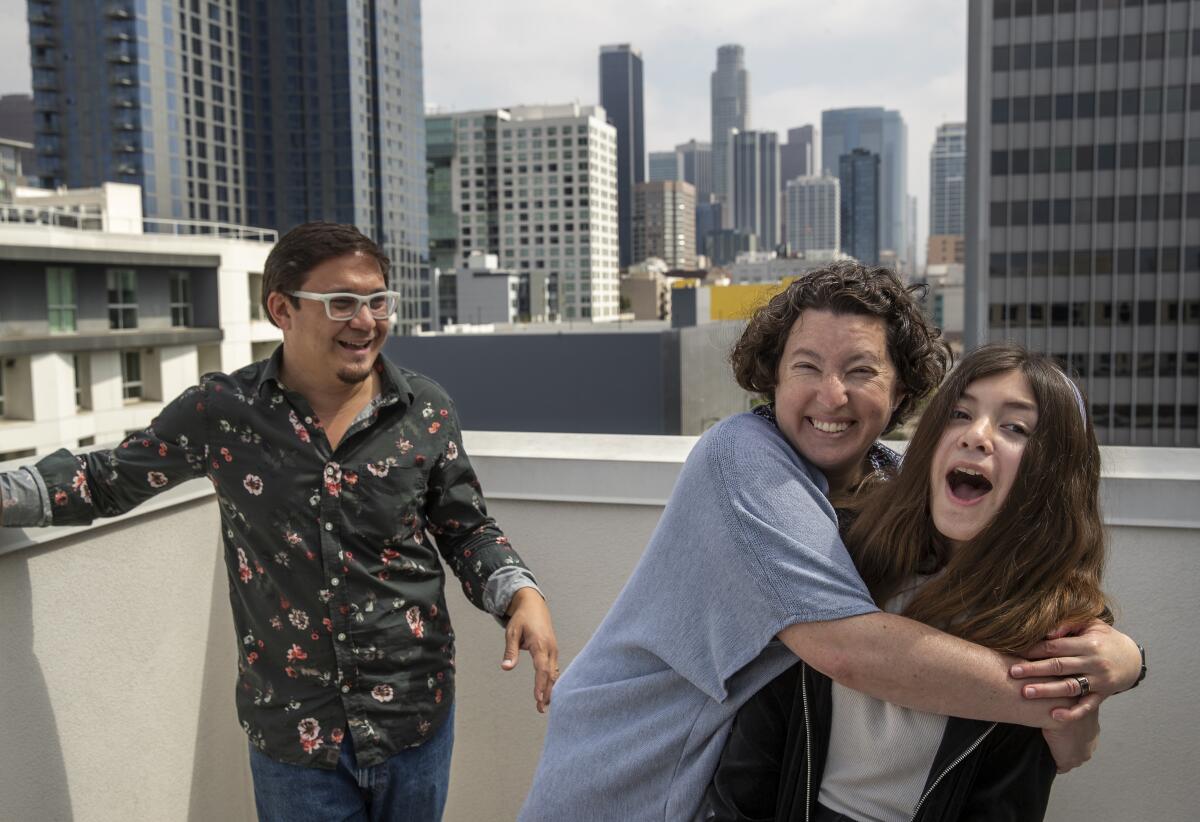
- Share via
Nearly every phase of California’s COVID-19 vaccine rollout has been met with a mixture of enthusiasm and angst. But few groups have been as eager — or as concerned — as the latest to wrestle with the availability of vaccines: parents.
The state on Thursday expanded eligibility for COVID-19 vaccines to adolescents from the ages of 12 to 15. In Los Angeles and many other counties, people in that age group must be accompanied by or receive consent from a parent or guardian to receive their shot.
Some parents are jumping at the chance to protect their kids from COVID-19, and from its rare but worrisome counterpart, multisystem inflammatory syndrome in children, or MIS-C. Downtown L.A. resident Ginny Brideau has already secured an appointment for her 12-year-old daughter, Iolani, to be vaccinated at Ralphs on Monday.
“Being able to go out [to the] movies, library, grocery store, see good friends, get to church — it will be a good thing,” Brideau said.
But others have expressed hesitation because of the newness of the vaccine, which was authorized for the age group by the Food and Drug Administration last week, and because coronavirus case rates already appear to be dropping. Some are declining to vaccinate their kids altogether.
“There is no reason we should require or expect our children to take experimental drugs whose long-term effects are unknown,” said Ronni Peck, a mother of three who lives in Sun Valley.
Peck, 40, has not received a COVID-19 vaccine, and said her kids — 9, 7 and 3 — won’t be receiving one either, “even when it becomes available to the under-10 group.”
“If long-term studies in the next few years deem the COVID vaccines truly safe, then I may reconsider both for myself and my children,” Peck said, noting that her children have received most other childhood vaccinations. “But in the meantime, I must choose to do what is best for myself and my children, and what I believe is best for us is to wait until there’s long-term data on this experimental vaccine before making a choice.”
Teenagers 12 to 15 are able to get the Pfizer-BioNTech COVID vaccine starting today. No appointment is needed at L.A. County-run sites.
Officials estimate that about half a million children from the ages of 12 to 15 live in L.A. County, and about 2.1 million in the state. Most experts say it will be imperative for them to be vaccinated in order to markedly reduce the amount of the virus circulating in the community.
“It is a key group of individuals for us to reach so that we can increase our coverage in terms of the county’s total population,” L.A. County Public Health Director Barbara Ferrer said during a news briefing Thursday.
Dr. Eric Ball, a pediatrician at Children’s Hospital of Orange County Primary Care Network, said he spent much of his day Wednesday counseling dozens of parents who were hesitant or concerned about vaccinating their kids.
He assured them that the vaccine is “remarkably effective and very safe” and noted that tens of millions of Americans have already been vaccinated without severe or serious reactions. The experience with the Johnson & Johnson vaccine — which was paused after a handful of recipients experienced blood clots — should create added confidence in the system’s ability to catch even the rarest of side effects, he said.
Ball’s pediatric practice includes people up to the age of 21. During the course of the pandemic, he had to hospitalize about half a dozen COVID-19 patients, he said, and one 20-year-old patient almost died of MIS-C. As a parent and a doctor, he couldn’t wait to make an appointment for his 12-year-old daughter to receive her shot at CVS.
“Most kids are fine, but you never know if you’re going to be the one kid who ends up with a horrible outcome,” Ball said. “It’s much safer to get the vaccine than to roll the dice with COVID.”
But some parents may require more convincing.
A recent Kaiser Family Foundation poll found that nearly 25% of U.S. parents who have at least one child from the ages of 12 to 15 said they will “definitely not get their child vaccinated.” About 26% said they will wait to see how it’s working, and 18% said they will vaccinate only if their child’s school requires it.
Dr. Rochelle Walensky, the director of the U.S. Centers for Disease Control and Prevention, acknowledged the hurdle Wednesday when she issued her official recommendation for the vaccine to be administered to adolescents 12 and older.
“Some parents have already made plans for their adolescents to receive a COVID-19 vaccine,” Walensky said. “Understandably, some parents want more information before their children receive a vaccine. I encourage parents with questions to talk to your child’s healthcare provider or your family doctor to learn more about the vaccine.”
The recommendation means many middle schoolers and virtually all high school students have the chance to be vaccinated before the next school year.
In California, some parents are pointing to rapidly improving case numbers as a reason not to vaccinate their kids. The state this month recorded its lowest hospitalization rate since the first few weeks of the pandemic.
“With Los Angeles COVID numbers plummeting without a single child under 16 having received the COVID vaccine, I don’t feel it’s necessary for the 12-to-15 age group to receive the COVID vaccine in order for us to ‘get back to normal,’” said one San Fernando mother, who asked to remain anonymous because the subject is “divisive.”
“We are not anti-vaxxers, but we don’t feel a COVID vaccine is necessary for children when COVID is mostly an adult illness,” she added.
Although COVID-19 case numbers have been lower in people younger than 18, they are not immune from the virus, said Dr. Katherine Williamson, a spokesperson for the American Academy of Pediatrics who also has a practice in California.
In fact, Williamson noted, young people have recently begun to present with more coronavirus cases: One AAP report found that 24% of new reported cases during the week ending May 6 were among children. By comparison, children have accounted for 14% of cumulative cases since the pandemic began. (The report’s definition of a “child” varies by state, but it accounted for people 19 and younger in the majority of states.)
Over the two-week period ending May 6, there was also a 4% increase in the cumulative number of child coronavirus cases, from about 3.71 million on April 22 to about 3.85 million.
“We know that kids are still a minority, but an increased minority of the number of cases that are becoming positive,” Williamson said, adding that she wants to make it clear to parents that COVID-19 is not a benign disease.
“Thousands of kids across the U.S. have been hospitalized with COVID, and hundreds have died,” she said. “That’s not a number that I think a parent would be comfortable risking for their child.”
Some fear the CDC is moving too fast in lifting COVID-19 mask guidance for the vaccinated.
Officials in Los Angeles have already begun partnering with schools to make the vaccines available to young people — particularly in neighborhoods hit hardest by the virus. Los Angeles Unified School District Supt. Austin Beutner called the move “an important part of the path to recovery in schools.”
“Herd immunity won’t be reached in schools or in the broader community until children are vaccinated,” Beutner said in a statement. Just this month, a fourth-grader at Lanai Road Elementary tested positive for the coronavirus.
So far, COVID-19 vaccines have not been mandatory for students, but the district has indicated that they will probably become a required immunization — along with MMR, chickenpox and Tdap — in future school years.
When that time comes, “we’ll have a tough decision to make,” said Studio City resident Lex Jurgen, who is holding off on vaccinating his kids, 14, 16 and 18.
“Ideally, we would not vaccinate the kids because their risk level from COVID is infinitesimal,” Jurgen said. “It seems odd to be injecting them with a largely untested vaccine against a virus that almost certainly won’t impact their health or safety.”
Jurgen is not opposed to the COVID-19 vaccine in general: He and his elderly parents have received their shots. His kids, too, have had their normal course of childhood vaccines.
“I don’t believe the vaccine is dangerous, merely untested and speculative when compared to almost no perceived benefits to them,” he added.
In L.A. County, Ferrer said that 16- and 17-year-olds showed a “significant amount of interest” in the vaccine and that nearly 35% of the age group has already received one dose since they became eligible just over a month ago.
Response to the rollout for the 12-to-15 cohort in Los Angeles so far has been “varied,” she said. The county on Tuesday will hold a virtual town hall meeting geared toward answering parents’ and teens’ questions about the vaccine.
“It’s important to note that there are, in fact, cases among children, and that children are particularly vulnerable whenever we see an increase in community transmission,” Ferrer said, adding that during the July and December surges, 10% to 17% of cases were occurring among children under the age of 18.
One parent, Studio City resident DJ Jenkins, said he couldn’t wait to to take his daughter to receive her first dose Friday — her 12th birthday.
“Being vaccinated, we’re helping to stop the spread and therefore protecting the most vulnerable among us,” Jenkins said, adding that he also hopes to vaccinate his 6-year-old son as soon as current trials find it safe for that age group.
“It’s a way to get back to normal life,” Jenkins said of the vaccines, “and to have that for our children after this last hard year is such a godsend.”
More to Read
Sign up for Essential California
The most important California stories and recommendations in your inbox every morning.
You may occasionally receive promotional content from the Los Angeles Times.
